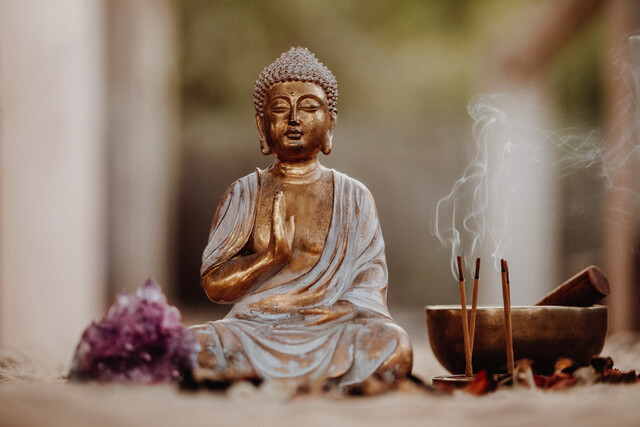Online Class: Japanese Cultural Studies

-
12Lessons
-
32Exams &
Assignments -
10Hours
average time -
1.0CEUs
Course Description
Delving into the Depths of Japan: A Journey through Time and Culture
Nestled to the east of China, Japan emerges as an enchanting archipelago, separated from the Asian mainland by a mere 120 miles of oceanic expanse. With a rich tapestry of history spanning over 30,000 years, Japan offers a mesmerizing blend of seclusion and global interaction. This dichotomy has birthed a culture that seamlessly fuses international influences while preserving its authentic Japanese essence.
Dive deep into this course as we journey through Japan's evocative history, tracing the ebb and flow of its interactions with the wider world. We will illuminate the vibrant traditions that have shaped the Japanese way of life, from the intricacies of its language to the spiritual depths of its religions. Feast your senses on the culinary wonders of Japanese cuisine, and understand the nuanced etiquettes that underpin social interactions.
Discover the Japanese commitment to excellence in careers and education, and marvel at the arts that have resonated through time — each art form narrating tales of seasons, emotions, and landscapes. Revel in the joyous celebrations of holidays and indulge in leisure activities that reflect a harmonious blend of the past and present. Stand in awe of the architectural marvels, from ancient temples to contemporary skyscrapers, each telling a story of Japan's journey through time.
At the heart of our exploration lies the Japanese ethos: a deep-rooted reverence for consideration, thoughtfulness, and order. These values make Japan one of the safest and most serene destinations globally. While immersing oneself completely might be challenging given the uniqueness of the culture, the beauty of the Japanese way of life invites appreciation at every turn.
Embark on this transformative journey with us, as we unravel the multifaceted layers of Japanese culture, offering insights that transcend the mere tourist gaze, plunging into the very soul of this ancient yet modern land.
Course Lessons
Lesson 1. Japan Unveiled: The Interplay of Geography and Culture
 Lesson 1 Video
Lesson 1 Video Lesson discussions: Reasons for Taking this Course
Lesson discussions: Reasons for Taking this Course Complete Assignment: Why this Course?
Complete Assignment: Why this Course? Assessment: Lesson 1 Exam
Assessment: Lesson 1 Exam Assessment: Lesson 1 Review Exam
Assessment: Lesson 1 Review Exam
Lesson 2. A Journey Through Japan's Cultural Heritage
 Lesson 2 Video
Lesson 2 Video Complete: Lesson 2 Activity
Complete: Lesson 2 Activity Assessment: Lesson 2 Exam
Assessment: Lesson 2 Exam Assessment: Lesson 2 Review Exam
Assessment: Lesson 2 Review Exam
Lesson 3. The Enigmatic Tapestry of Japanese Language and Culture
 Lesson 3 Video
Lesson 3 Video Assessment: Lesson 3 Exam
Assessment: Lesson 3 Exam Assessment: Lesson 3 Review Exam
Assessment: Lesson 3 Review Exam
Lesson 4. A Harmonious Tapestry: Religions and Beliefs in Japan
 Lesson 4 Video
Lesson 4 Video Complete: Lesson 4 Activity
Complete: Lesson 4 Activity Assessment: Lesson 4 Exam
Assessment: Lesson 4 Exam Assessment: Lesson 4 Review Exam
Assessment: Lesson 4 Review Exam
Lesson 5. The Secret to Longevity: A Journey Through Japan's Culinary Landscape
 Lesson 5 Video
Lesson 5 Video Complete: Lesson 5 Activity
Complete: Lesson 5 Activity Assessment: Lesson 5 Exam
Assessment: Lesson 5 Exam Assessment: Lesson 5 Review Exam
Assessment: Lesson 5 Review Exam
Lesson 6. Mastering Business Etiquette in Japan: The Art of Meishi
 Lesson 6 Video
Lesson 6 Video Assessment: Lesson 6 Exam
Assessment: Lesson 6 Exam Assessment: Lesson 6 Review Exam
Assessment: Lesson 6 Review Exam
Lesson 7. Navigating Japanese Homes: Etiquette Essentials
 Lesson 7 Video
Lesson 7 Video Assessment: Lesson 7 Exam
Assessment: Lesson 7 Exam Assessment: Lesson 7 Review Exam
Assessment: Lesson 7 Review Exam
Lesson 8. Harmony and Hierarchies: Inside Japan's Corporate World
 Lesson 8 Video
Lesson 8 Video Complete: Lesson 8 Activity
Complete: Lesson 8 Activity Assessment: Lesson 8 Exam
Assessment: Lesson 8 Exam Assessment: Lesson 8 Review Exam
Assessment: Lesson 8 Review Exam
Lesson 9. Brushstrokes and Beyond: Exploring Japan’s Art Forms
 Lesson 9 Video
Lesson 9 Video Complete: Lesson 9 Activity
Complete: Lesson 9 Activity Assessment: Lesson 9 Exam
Assessment: Lesson 9 Exam Assessment: Lesson 9 Review Exam
Assessment: Lesson 9 Review Exam
Lesson 10. Unearthing the Rich Tapestry of Japanese Culture: Traditions and Modernity in Harmony
 Lesson 10 Video
Lesson 10 Video Assessment: Lesson 10 Exam
Assessment: Lesson 10 Exam Assessment: Lesson 10 Review Exam
Assessment: Lesson 10 Review Exam
Lesson 11. Tradition Meets Modernity: The Intricate Architecture of Japan
 Lesson 11 Video
Lesson 11 Video Assessment: Lesson 11 Exam
Assessment: Lesson 11 Exam Assessment: Lesson 11 Review Exam
Assessment: Lesson 11 Review Exam
Lesson 12. The Japanese Government: Tradition Meets Innovation
 Lesson 12 Video
Lesson 12 Video Lesson discussions: End of Course Poll; Course Comments; Reasons for Taking this Course
Lesson discussions: End of Course Poll; Course Comments; Reasons for Taking this Course Complete: Lesson 12 Activity
Complete: Lesson 12 Activity Assessment: Lesson 12 Exam
Assessment: Lesson 12 Exam Assessment: The Final Exam
Assessment: The Final Exam Assessment: Lesson 12 Review Exam
Assessment: Lesson 12 Review Exam
Learning Outcomes
- Define the impact of Japan's geographical features on its cultural and historical development by listing three examples from different time periods.
- Identify and explain two ways in which traditional Japanese farming techniques have influenced modern sustainable practices, using specific examples.
- Define the historical evolution and cultural significance of the kimono and its continued role in modern Japanese society.
- Demonstrate an understanding of the Japanese tea ceremony, including its historical origins and the spiritual principles it embodies.
- Describe the artistic contributions of geisha, highlighting their impact on cultural preservation and performance artistry within Japanese society.
- Demonstrate understanding of the evolution of the Japanese written language by explaining the historical transformation and current usage of kanji, hiragana, and katakana.
- Describe the impact of globalization on the Japanese language by identifying examples of Western influences and discussing their integration into modern Japanese communication.
- Define the ways in which Shinto and Buddhism coexist and influence cultural practices in Japan by identifying specific rituals associated with each religion.
- Describe the impact of Confucianism on Japanese social structure by outlining its influence on educational systems and hierarchical societal interactions.
- Give examples of traditional Japanese dishes and describe the cultural significance of their preparation and ingredients.
- Define the key components of the Japanese diet and explain their impact on health and longevity.
- Describe how Japanese bowing etiquette reflects levels of respect and social relationships.
- Identify cultural differences in communication styles by comparing indirect language use in Japanese interactions to direct approaches in Western cultures.
- Demonstrate mastery of lesson content at levels of 70% or higher.
Additional Course Information

- Document Your Lifelong Learning Achievements
- Earn an Official Certificate Documenting Course Hours and CEUs
- Verify Your Certificate with a Unique Serial Number Online
- View and Share Your Certificate Online or Download/Print as PDF
- Display Your Certificate on Your Resume and Promote Your Achievements Using Social Media

Student Testimonials
- "I liked it and this is an initial way to learn about Japanese culture. Every lesson could be a course itself." -- Sharon S.
- "The course offers great insight into Japanese culture, traditions, religion, food, art, history, and is great for travelers, educators and people seeking introductory cultural enlightenment." -- Andrew E.
- "Learning about the Japanese culture has truly opened up my eyes about Japan." -- Taylor C.
- "The written information was very helpful to me it was very interesting and enjoyable, and easy to get the right information without having to read a whole book to get the right answers." -- Eileen E.
- "All the written material was relevant to my interest, and much of it - not all - was new to me." -- Peter H.







